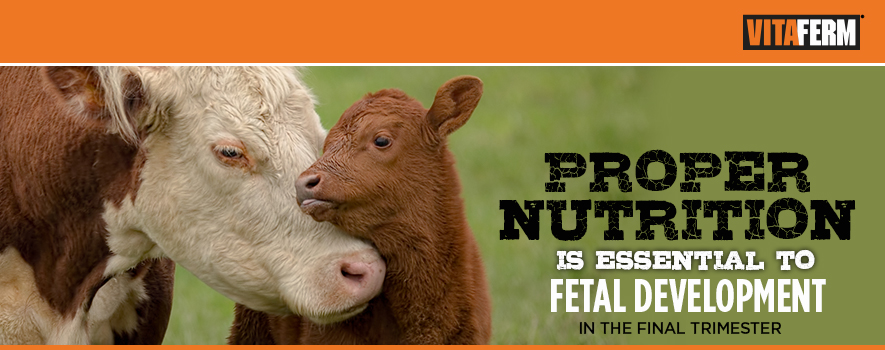
Producers devote a lot of time, energy, expense and effort to make sure their cows have a good nutrition program in place just prior to calving, through lactation and breeding season. What about their last trimester of gestation? Proper nutrition during pregnancy, and especially those last weeks, play a key role in the development of the calf and ensure its survival once it is on the ground.
During the third trimester, the fetus is being prepared for its life outside of the womb. During this time, the most rapid growth of the calf occurs, and the lungs mature, getting it ready for delivery. This is the time of year when producers will start looking for a way to cut some expenses, but those costs shouldn’t be cut in the way of cow nutrition – that first milk that makes sure calves get off to a healthy start.
Research has proven that proper nutrition of the fetus during pregnancy has profound impacts on feedlot performance and has a positive influence on overall health and immunity of the calf. All nutrients play a pivotal role in fetal growth and development, but it’s a matter of providing enough of the “right” ones at the “right” time. Energy and protein are the most common considerations when assessing a nutrition program during gestation as they are usually the most limiting nutrients. However, don’t take a good vitamin and mineral program for granted. Metabolism and many other fundamental bodily processes rely on adequate macro and trace mineral supplementation. These nutrients play an important role in bone formation, hormone development and secretion, enzyme function and more. Trace minerals known to have a significant impact on reproduction and subsequent calf health are zinc, chromium, selenium, iron and manganese. Sufficient trace mineral supplementation ensures proper growth of the fetus and play a key role in colostrum quality and immunoglobulins produced.
A cow’s nutrient requirements in early gestation aren’t terribly different than her daily maintenance requirements, but as fetal growth increases so does the rest of her nutritional needs. During this time, you aren’t just feeding the cow, you are also feeding her growing and developing calf. Once a cow enters lactation, she will need a much higher level of protein and energy. If her feeding program isn’t meeting her needs she will begin to pull condition off her back to continue providing for her calf, and her performance will begin to lag. You will also need to feed a first-calf heifer or second-calf female much differently than a mature cow. A young pregnant female that is still growing needs more protein than a mature cow. If there aren’t enough nutrients for the heifer and her growing fetus, she will use what is available first to meet her own growth and maintenance needs.
To be sure that your cows are receiving adequate nutrition, provide them a high-quality supplement like VitaFerm® Concept•Aid®. The high vitamin and mineral fortification caters to the heightened nutrient requirements of the cow during the last trimester and early lactation. BioZyme® utilizes organic trace minerals, the highest quality and most stable bioavailable trace minerals on the market, and high levels of Vitamin E in all their Concept•Aid products. In addition to a suite of vitamins and minerals, Concept•Aid includes Amaferm®, is a prebiotic designed to enhance digestibility by amplifying the nutrient supply for maximum performance. It is research-proven to increase intake, digestion and absorption.
Concept•Aid is available in different formulations to compliment different forage types and qualities to maximize animal performance. BioZyme also offers Concept•Aid in a tub for added convenience, and multiple protein options to meet protein requirements during specific stages of production.
Final fetal development in the third trimester is important to getting a live, healthy calf on the ground. Make sure your cows are ready in that final trimester to deliver a healthy calf that will grow, gain and put profit in your pocket. Take the steps to provide the right nutrients at the right time, and be sure to give your calves the nutritional advantage they deserve.


